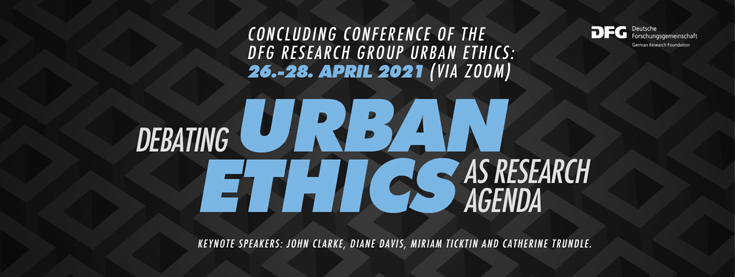Debating Urban Ethics as Research Agenda

Concluding Conference of the DFG Research Group Urban Ethics:
26-28 April 2021 (via zoom)
What can a focus on urban ethics, on ethical dynamics and dynamics of ethicization in urban contexts, contribute to a better understanding of cities and urban life? The concluding conference of our multidisciplinary research group foregrounds current debates and future perspectives on urban ethics in order to capture the complexities and challenges of this research agenda. We take this opportunity to present concluding results from our group’s research projects on urban environmental ethics in Auckland, ethical conjunctures in mobility activism in Mexico City, charity ‘tandems’ in Munich, activism toward a “just city” and the violence of ethics in New York City, the social-urban transformations of Rio de Janeiro’s port zone and the regulation of prostitution in Tbilisi. We invite international experts working on urban ethics to participate in any of our four major themes:
- Governance: as the practices of negotiation, contestation, and participation through which cities, as well as their infrastructures and environments, are managed.
- Recognition and restitution: as key concepts used to claim dignity amid the ethical politics of representation of urban dwellers, who seek to rescue and protect their cultural heritage and gain historical justice.
- Social relations and moral economies: with attention to articulations of solidarity in urban grassroots movements.
- Ethics and politics: as interrelated fields of practice with moral implications and dependence on social, cultural and historical contexts.
With our approach in this conference, we also seek to challenge prevalent discourses and practices on urban ethics such as the “civilizing” and “uplifting” missions of morality professed by upper classes and experts, the (de)politicization of bottom-up initiatives through “ethical” governance, the aesthetics and subjectivations of “good” urban lifestyles, anti-moralist clichés of “do-gooder” activism, paternalistic discourses, as well as the dangers of marketing “green politics” in neoliberal economies. The conference will be structured in four sessions and four key notes (Diane Davis - Harvard, John Clarke - Open University, Miriam Ticktin – The New School, and Catherine Trundle - Victoria University of Wellington).

